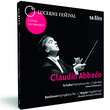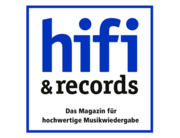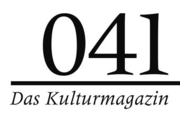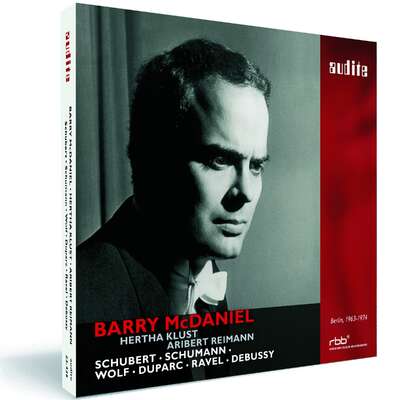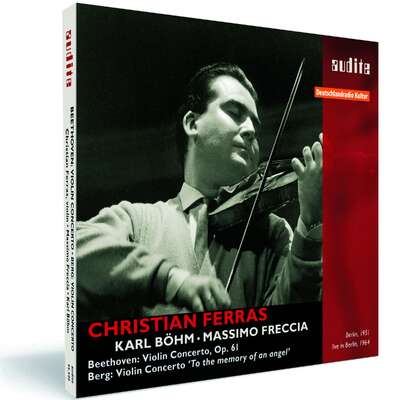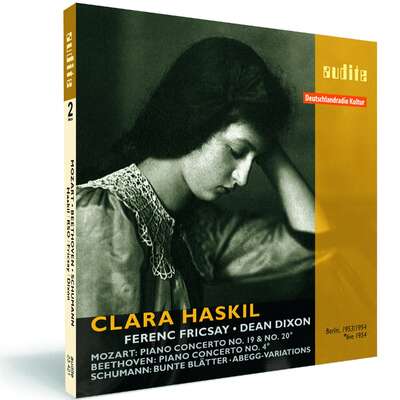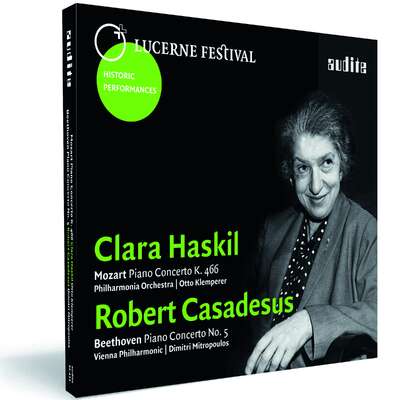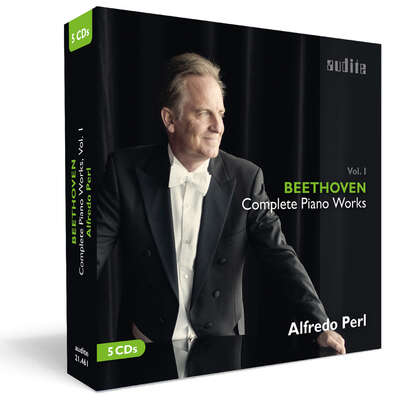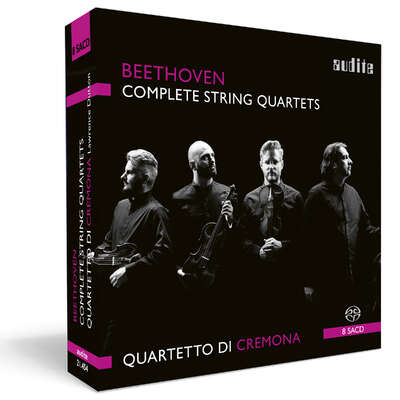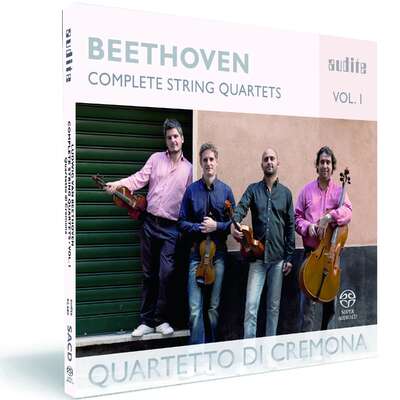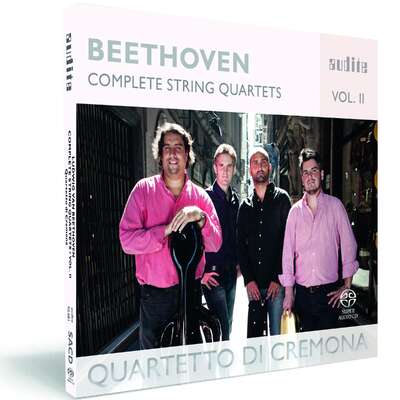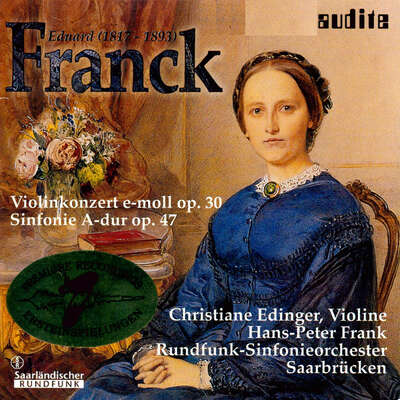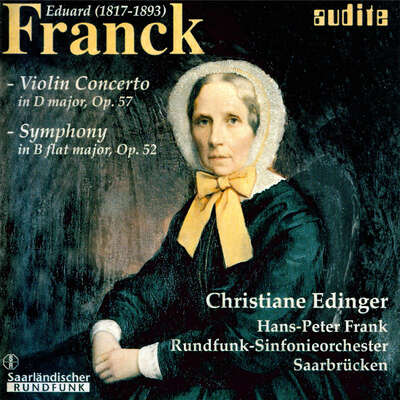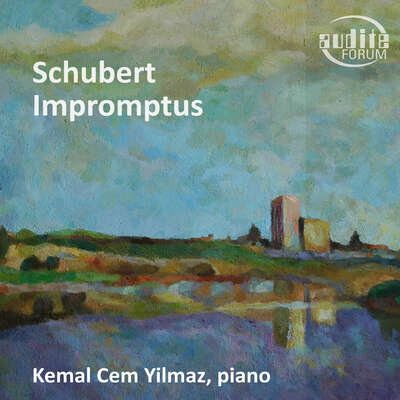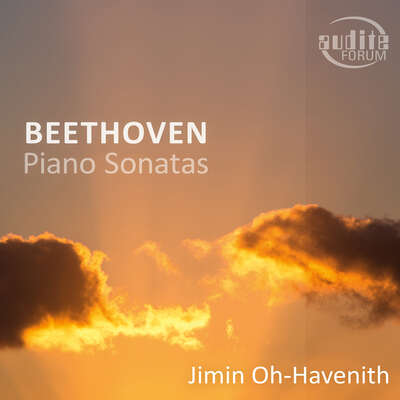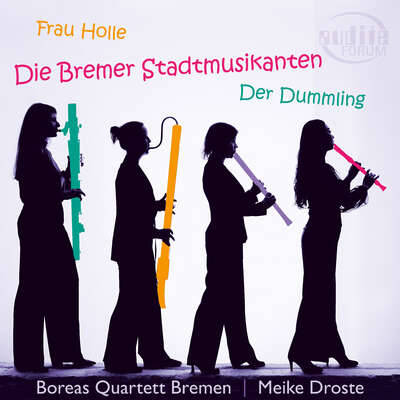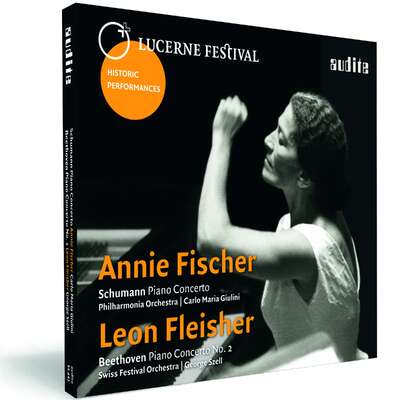
Claudio Abbado (1933-2014) was closely associated with LUCERNE FESTIVAL for nearly five decades. In memory of this exceptional conductor, two live recordings with the Vienna Philharmonic and the Chamber Orchestra of Europe, made in the summers of 1978 and 1988, are issued here for the first time, revealing all elements of his art: a rousing vitality and emotional immediacy, radiant orchestral splendour and structural transparency.more
"This interpretation combines dappled colours with a round, gentle ripeness that is likely to render all but a handful of others drab by comparison." (International Record Review)
Details
|
Claudio Abbado conducts Schubert, Beethoven & Wagner
LUCERNE FESTIVAL Historic Performances, Vol. 5 |
|
| article number: | 95.627 |
|---|---|
| EAN barcode: | 4022143956279 |
| price group: | BCR |
| release date: | 14. March 2014 |
| total time: | 77 min. |
Bonus Material
-
Producer's Comment
First-hand impressions of producer Ludger Böckenhoff [German]
- BR-Klassik_CD-Tipp_20140408
- Lucerne Festival series_Klassikkonzerte_042014
Informationen
In memory of Claudio Abbado, who died on 20 January 2014 and who was closely associated with LUCERNE FESTIVAL for nearly five decades, audite and LUCERNE FESTIVAL are issuing three previously unreleased live recordings, approved by the conductor himself: on 5 September 1978, Claudio Abbado and the Vienna Philharmonic performed Franz Schubert's Unfinished in Lucerne - a moving interpretation, emphasising the lyrical character of the work and creating a single arc of suspense from the sombre opening to the concluding transfiguration of the second movement. This work closes a circle insofar as Claudio Abbado also conducted Schubert's Unfinished at his final concert, given on 26 August 2013 in Lucerne.
On 25 August 1988, on the occasion of the festival's fiftieth anniversary, Abbado and the Chamber Orchestra of Europe performed exactly the same programme with which Arturo Toscanini had opened the Luzerner Festspiele in 1938, including Ludwig van Beethoven's Second Symphony and Richard Wagner's Siegfried Idyll, the latter written in Lucerne. The Neue Zürcher Zeitung commented enthusiastically that "the sonic subtleties of the Siegfried Idyll were masterfully executed and carried through to a poignant ending with consistency in form and content. And in Abbado's interpretation of Beethoven's Second Symphony the structural clarity of the individual movements was combined with an unabated, almost newly inspired joy of performing amongst the orchestra".
All three live recordings are released here for the first time. A particularly attractive aspect of this compilation is the fact that Abbado made studio recordings of the Beethoven and Schubert symphonies with the "opposite" orchestras - i.e. Schubert's Unfinished with the Chamber Orchestra of Europe (1987) and Beethoven's Second Symphony with the Vienna Philharmonic (1988) - allowing revealing insights. The extensive booklet in three languages contains a portrait of Claudio Abbado by Peter Hagmann, tracing the conductor's long-standing activities in Lucerne; also included are previously unpublished photos from the archives of LUCERNE FESTIVAL.
Claudio Abbado stamped his mark on LUCERNE FESTIVAL as no other conductor. The artistic relationship between festival and conductor lasted for nearly half a century: Abbado made his début at Lucerne in the summer of 1966, performing Sibelius' Violin Concerto, Hindemith's Symphonic Metamorphoses and Mendelssohn's Italian Symphony together with the violinist Zino Francescatti and the Swiss Festival Orchestra. The Neue Zürcher Zeitung witnessed a "delightfully unspoiled maestro with an uncorrupted musical spirit" and made the accurate prediction that "this will not have been the last time that Claudio Abbado has conducted in Lucerne". He was to return countless times, soon on an annual basis, appearing with the Philharmonia Orchestra and the Vienna Philharmonic, the ensembles of La Scala, Milan, the London Symphony Orchestra and the Berlin Philharmonic, and of course with the orchestras that Abbado himself had founded: the European Union Youth Orchestra, the Chamber Orchestra of Europe, the Gustav Mahler Youth Orchestra and the Mahler Chamber Orchestra. In 2003 Claudio Abbado and Michael Haefliger jointly founded the LUCERNE FESTIVAL ORCHESTRA, an orchestra unique in the world in uniting long-standing artistic colleagues of Abbado's - internationally renowned soloists, chamber musicians and music professors alongside the core performers from the Mahler Chamber Orchestra - into an ensemble in a league of its own. Standing on the podium in front of this "Orchestra of Friends", as he himself called it, Claudio Abbado ended his artistic career on 26 August 2013 in Lucerne, having conducted Franz Schubert's Unfinished and Anton Bruckner's Ninth Symphony at his last concert.
This release is furnished with a "producer's comment" by producer Ludger Böckenhoff.
Reviews
ClicMag | N° 124 - Mars 2024 | Jean-Charles Hoffelé | March 1, 2024
Quel étrange retour en arrière. Abbado était devenu à un tel pointMehr lesen
Stereoplay | 09|2016 | Lothar Brandt | September 1, 2016 HighClass in HiRes
Im Jubiläumsjahr 1988 dirigierte er [Claudio Abbado] das Chamber Orchestra of Europe mit Toscaninis Premieren-Programm. Und vom 25. August ist uns das meisterhaft in alle Subtilität ausgehorchte Wagner-Werk vom Schweizer Rundfunk erhalten.Mehr lesen
De Gelderlander | Vrijdag 26 Juni 2015 | Maarten-Jan Dongelmans | June 26, 2015 Archiefmateriaal als prettige reddingsboei krimpende omzet
Schuberts Onvoltooide (1978) en Beethovens Tweede symfonie (1988) klinken gloedvol en expressief.Mehr lesen
Fanfare | 26.03.2015 | Huntley Dent | March 26, 2015
This is a commemorative album of Abbado’s years at the Lucerne Festival, which spanned five decades. He became a major presence there from 2000Mehr lesen
That’s also where the highlight of the CD occurs, in a dashing account of the Beethoven Second Symphony that surpasses what Abbado usually achieved with Beethoven on disc. I expected a polished, rather noncommittal reading, but this one is fully engaged (actually, the Second Symphony was notably successful in Abbado’s two Beethoven cycles for DG). It has pace in every movement and some jauntiness in the Larghetto. Using a chamber orchestra doesn’t shrink the sonorities by much, although you’d never think this was Karajan and the Berlin Philharmonic—that sort of massiveness became less to Abbado’s taste in his maturity. (With Berlin he performed even a middle-period symphony like the “Pastorale” with reduced strings, I believe.)
The Schubert “Unfinished” performance isn’t as alive or as convincing. Abbado delivers the kind of high-level subscription concert reading to be heard seven days a week in major music capitals. He seems to have no special affection for the score. To avoid complete impersonality, he makes the soft passages quite soft in contrast with the fortissimo outbursts in the first movement. But the big tune feels anemic as a result, and in the Andante second movement the melting woodwind solos are a touch businesslike. Couldn’t the radio archives yield up something more striking?
Conducting Wagner is inescapable if you are the chief conductor of the Berlin Philharmonic, but Abbado avoided his duty on disc, leaving only a single CD completely devoted to orchestral excerpts; everything else was with singers like Jonas Kaufmann and Bryn Terfel. The sole Wagner opera he recorded was Lohengrin in 1995 (it turned out so well one wonders why DG didn’t ask for more). This live Siegfried Idyll is a premiere recording in the Abbado discography so far as I can tell. It is gentle, civilized, and nicely balanced, but not very involved. Wagner presented the work as a present to Cosmia when she woke up on Christmas morning in 1870, not just before she went to bed. The villa where a small ensemble of musicians gathered on the stairs to play the piece was in present-day Lucerne, hence the connection. After a relaxed 15 minutes Abbado does stir up some energy at the climax, but that’s not quite good enough.
In all, this new release is half a loaf, serving mainly as a memento to a great conductor, not captured at his very best, unfortunately.
Revue Musicale
| 68e année, N° 1 Mars 2015 | M. Tètaz | March 1, 2015
Archives du Lucerne
Festival Hommage à Abbado et Kubelik
Avec le Philharmonique de Vienne, il offre une Inachevée très symphonique, d'une lenteur solennelle, d'une intensité dramatique conduite magistralement, avec une mise en valeur des couleurs sonores, graves et chaudes, de l' orchestre autrichien; on entend Vienne autant qu'Abbado. L’unisson des cordes est fabuleux et le son des cors, sans agressivité, unique. C'est une version pleine de grandeur, d'énergie, qui appartient à son époque. Mehr lesen
Schwäbische Zeitung | Samstag, 20. Dezember 2014 | man | December 20, 2014 Festspielklänge aus Luzern
Eine CD-Reihe zur Geschichte der Luzerner Festspiele bringt das LabelMehr lesen
Audio Technique | 11/2014 | Stephen | November 1, 2014
chinesische Rezension siehe PDF!Mehr lesen
International Record Review | November 2014 | Patrick Rucker | November 1, 2014
These superb live performances further document the near half-century-long association of the Lucerne Festival and the late Claudio Abbado, whoMehr lesen
As unlikely as it might seem to describe any interpretation of the 'Unfinished' as startlingly original, that is the inescapable impression left by this performance. The gripping intensity of the first movement is tempered by a lithe grace. Divested of weighty stolidity, the music gains credibility as the creation of a young man portraying an epic confrontation. Schubert's dissonances, often lost in the fulsome thickness of string sound, here emerge as sharp and painful. If there is anything to be regretted, it is that the exposition was not repeated. The Andante is often interpreted as an antidote to the scathing conflicts and tensions unearthed in the first movement. Not so here. The dramatic impetus of the Allegro moderato, in some ineffably sublimated form, is extended, telescoped, even compounded into the farthest reaches of the slow movement, which seems to speak of cosmic loneliness. Meanwhile, it is blessed by the Vienna winds, for theirs is the sound most nearly approaching perfection. This performance alone is easily worth the price of the disc.
In the wake of the tragically inflected 'Unfinished', the robust and buoyant D major Beethoven of the Chamber Orchestra of Europe comes as a shift to sunny skies and sweet breezes. After the ample, spacious introduction, the Allegro con brio fairly bristles with energy, each perfectly calculated sforzando contributing to a palpable joy in unified precision of execution. Bucolic vistas and subtle intrigues in the Larghetto are described with refined brushwork, using a delicately blended palette. A scherzo more witty than raucous provides the swift transition to the finale, lithe, athletic and brimming with detail, that is the summation and fulfilment of all that has gone before. This performance could serve as a paradigm of the symphonic ideal, bequeathed by Haydn and Mozart, to be exalted by Beethoven.
This Siegfried Idyll is a Wagnerian canvas with the varnish of pretence and excess painstakingly removed. What remains is unalloyed ardour, simply expressed with disarming directness. This interpretation combines dappled colours with a round, gentle ripeness that is likely to render all but a handful of others drab by comparison.
www.artalinna.com | 20 octobre 2014 | Jean-Charles Hoffelé | October 20, 2014 Back to Lucerne
Les extraits de concerts publiés aujourd’hui par Audite ne remontent pas si loin. L’Inachevée avec Vienne, murmurée, diaphane, respirée avec une tendresse et une émotion au-delà du dicible [...] Mehr lesen
American Record Guide | September 2014 | Roger Hecht | September 1, 2014
All these performances are from the Lucerne Festival in the years before Claudio Abbado formed his hand-picked Lucerne Festival Orchestra in 2003.Mehr lesen
Annotator Peter Hagmann describes this performance of Franz Schubert’s Unfinished Symphony as traditional. I have read reviews that agree, adding that Abbado’s recent Schubert is more modern, leaner in texture, and controversial. I haven’t kept up with Schubert recordings in recent years, so I’m in no position to argue. That said, I don’t recall hearing many performances quite like this one from around 1978, especially the first movement, which is dramatic, dark, and even stormy in places. The tempo is a good deal slower than its marking, particularly in transitions, though it maintains its motion. The quieter passages are quiet and mysterious, perhaps even worrying. The Andante is not as relatively slow or as mysterious as I, but it is more serene and mostly at peace. Not all is forgotten, though, as the firm sterner intervals remind us. Quite interesting is how some of the quiet moments, particularly near the end, anticipate the performance of Wagner’s Siegfried Idyll from ten years later that is on this disc. The Vienna Philharmonic is the perfect orchestra for this kind of Schubert.
The Siegfried Idyll from 1988 is gentle and childlike with atmosphere that is luminous and touching. It is well known that Debussy was influenced by Wagner, but it would be easy to imagine that the influence ran in both directions from listening to this. While the Schubert is the most interesting performance on this program, the Wagner is probably the best, mainly because it has a luminosity I’ve not heard elsewhere in this work. Even so, for a performance by a small orchestra, I’m drawn more to the one Solti led many years ago with the Vienna Philharmonic on Decca. That one is more closely recorded, more imaginative in phrasing, and more vital overall.
The Beethoven comes from the same concert as the Wagner. Again, the performance is small in scale, with technique that is taut and deft. One major difference between the playing here and in the Schubert is that where the Viennese dig into the music, the COE tends to sail over the notes more, and their energy is linear. They do this with great dexterity, but they also create a sameness that carries through all the movements. I is straightforward as well as cleanly delineated and structured. The Larghetto is just as straightforward with a touch of affection. The last two movements are similar and just as deftly played. The Chamber Orchestra of Europe produces a good-sized sound for a smaller orchestra, but I still miss the plushness a larger ensemble can produce in this music.
The sound is very good. The interesting notes are concerned mainly with Abbado and his relationship with the Vienna Philharmonic and his history with the Lucerne Festival.
Diapason | N° 627 - Septembre 2014 | Rémy Louis | September 1, 2014
Claudio Abbado à Lucerne, avant la recréation de l'Orchestre du Festival, mais à la tête de deux formations importantes dans sa trajectoire. LesMehr lesen
Dans la Symphonie n° 2 de Beethoven (25 août 1988), Abbado semble au contraire vouloir inculquer les règles bien comprises du classicisme viennois aux jeunes musiciens du Chamber Orchestra of Europe. Elan, motricité (les attaques des violoncelles et contrebasses), netteté des accents et de l'articulation: voilà une gravure pleine de fraîcheur, un peu appuyée parfois dans le Larghetto – avec la même formation, Nikolaus Harnoncourt devait très vite aller plus loin encore.
Issu du même concert, Siegfried Idyll n'évoque ni les frémissements à fleur de peau d'un Walter, ni l'émotion d'un Knappertsbusch. Mais une élégie idéale et cristalline, en apesanteur, dont la subtile plasticité orchestrale est empreinte d'une sensibilité réservée – à bien y réfléchir, cette légère distanciation imprègne toutes ces lectures (inédites), fût-ce de façon délicatement différente. Le son est splendide de vérité et de présence.
Fanfare | 20.August 2014 | Jerry Dubins | August 20, 2014
Though the performance on the present disc may be closer in tempos to Abbado’s Vienna account, it has a more buoyant feel and more transparent soundMehr lesen
If it’s Abbado’s Siegfried Idyll you want, this live performance from the 1988 Lucerne Festival may be your only choice. I wouldn’t swear to it, but it doesn’t look like there’s another recording of him leading the piece. Abbado was no stranger to Wagner—he recorded a complete Lohengrin with Siegfried Jerusalem and Cheryl Studer for Deutsche Grammophon, plus several single discs containing vocal numbers and orchestral excerpts from Wagner’s operas, but I don’t find another Siegfried Idyll among them.
This is certainly a worthy addition to Abbado’s recorded legacy, and it’s self-recommending to all fans of this great 20th-century conductor.
Fanfare | 18.08.2014 | James Miller | August 18, 2014
In 1961, George Szell, who had examined a Photostat of the manuscript, inserted what he called “a pungent dissonance” at bars 109 and 327 of theMehr lesen
It was too long ago to remember nuances, but I recall having a high opinion of Claudio Abbado’s set of the Beethoven symphonies that he recorded with the Vienna Philharmonic (I also liked the Art Nouveau covers.). Unfortunately, I have heard very little of his subsequent Berlin Philharmonic set so I can’t make any relevant comparisons with this 1988 performance of the Second Symphony with the Chamber Orchestra of Europe, but it’s hard for me to believe that either performance of the Second could be any better. Although the symphony can also be effective when the inner movements are taken a bit slower, I find its energy and crisp detail virtually irresistible. All repeats are taken but the symphony never seems long—if anything, it’s over with too fast. Some people claim that it is with the “Eroica” that we finally hear the “real” Beethoven, but a case can be made for the Second Symphony, and I think Abbado makes it. I’ve never heard one that I admire more than this performance.
The leaves the Siegfried Idyll, a piece that is very difficult to ruin no matter what tempo you choose. I have an impression that conductors of an earlier generation took it faster. Abbado’s, at 19:11, is one of the slower ones, but it’s beautifully played and never sags. I might mention that Abbado himself approved the release of these recordings—as well he should have.
Le Devoir | 19 juillet 2014 | Christophe Huss | July 19, 2014 Les derniers feux de Claudio Abbado
Les ultimes concerts du chef italien Claudio Abbado, décédé le 20 janvier dernier, ont été enregistrés. Mieux encore, ils sont édités en CD ou en DVD.Mehr lesen
www.concertonet.com | 07/15/2014 | Sébastien Gauthier | July 15, 2014
Un bon disque, donc, qui, à la fois en raison du caractère inédit des enregistrements et de la qualité interprétative, peut être acquis en toute confiance même si, à notre sens, les témoignages filmés de Claudio Abbado à la tête de l’Orchestre du festival de Lucerne sont des preuves plus convaincantes des excellentes relations nouées entre le chef italien et la ville suisse.Mehr lesen
hifi & records | 3/2014 | Ludwig Flich | July 1, 2014
Die Konzertmitschnitte sind nicht schlackenlos, aber sorgfältig aufbereitet. Auch dank des inhaltsreichen Booklets ein Album, das sich kein Abbado-Fan entgehen lassen sollte.Mehr lesen
Heilbronner Stimme | Donnerstag, 5. Juni 2014 | Uwe Grosser | June 5, 2014 Souveräner Maestro
Schon der Auftakt mit Schuberts „Unvollendeter“ [...] ist purer Genuss. [...] Und zur Beschreibung des „Siegfried-Idylls“ in Abbados Interpretation bedarf es nur eines Wortes: souverän. Eine großartige CD.Mehr lesen
Crescendo | Juni - Juli - August 2014 | CS | June 1, 2014 Abbado at his best
Gemessen an heutigen Standards dürfen wir staunen, wie elegisch zart und natürlich die Wiener vor 35 Jahren Schubert spielten! Auch die spieltechnisch gleichfalls höchstkarätigen 1988er Mitschnitte klingen noch erstaunlich kultiviert und innig – nicht, dass die Dynamik der Form bezwingend erfasst wäre, doch Zauber und Leichtigkeit sind da, und der Aufnahmeklang stützt die Transparenz.Mehr lesen
Gramophone | June 2014 | Rob Cowan | June 1, 2014
[...] The beautifully paced Siegfried Idyll is another gem, again graced by some exceptionally sensitive playing … there’s plenty ofMehr lesen
Classica – le meilleur de la musique classique & de la hi-fi | n° 163 juin 2014 | Stéphane Friédérich | June 1, 2014
Les enregistrements inédits que nous propose le label Audite furentMehr lesen
www.opusklassiek.nl | juni 2014 | Aart van der Wal | June 1, 2014
Het Duitse Audite kwam onlangs met een cd met uitsluitend live-uitvoeringen die een goed beeld geven van de dirigeerprestaties van Abbado in de periode 1978-1988. Een extra winstpunt daarbij is dat deze opnamen nog niet eerder zijn verschenen, in tegenstelling tot al die andere Abbado-opnamen die al vele malen zijn gerecycled en die eerMehr lesen
www.amazon.de | 25. Mai 2014 | Rosi Raber | May 25, 2014
Claudio Abbado ist einfach ein großer Meister; glücklich, wer sich seine Life-Konzerte leisten kann. Aber mit dieser CD kann man seineMehr lesen
www.amazon.de | 12. Mai 2014 | gemihaus | May 12, 2014 Abbados frühe Lucerner Zeit mit seinem neugegründeten 'Chamber Orch. of Europe'
audite sei Dank, diesen Radio-Mitschnitt aus den Archiven ins akustische hier und heute offenbart zu haben. Und zudem ein Fund, der sich lohnt, GehörMehr lesen
Audiophile Audition | May 5, 2014 | Gary Lemco | May 5, 2014
Newly-released Abbado performances from Lucerne provide pedestrian Schubert but exhilarated readings of Beethoven and Wagner.Mehr lesen
Musica | numero 256 - maggio 2014 | Giuseppe Rossi | May 1, 2014
Abbado pur utilizzando la versione corrente per orchestra da camera punta su una restituzione di grande trasparenza timbrica chiedendo agli archi una certa parsimonia di vibrato e contando sul dialogo finemente cesellato dalle prime parti dell’orchestra. I tempi piuttosto scorrevoli, la semplicità e allo stesso tempo la tensione interna del fraseggio scongiurano comunque ogni rischio di compiacimento lezioso in un’esecuzione che è doveroso includere fra le bellissime di una discografia pur eccezionalmente vasta e prestigiosa.Mehr lesen
RBB Kulturradio | 22.04.2014 | April 22, 2014 CD der Woche
Die erste CD, die nach dem Tod von Claudio Abbado dem Gedenken an den großen Dirigenten gewidmet ist, kommt aus Luzern. Dort war Abbado seit seinemMehr lesen
Auf der CD sind Ausschnitte aus zwei Konzerten der Jahre 1978 und 1988 zusammengefügt. Sie führen noch einmal vor Ohren, welche Entwicklung Claudio Abbado in diesem Jahrzehnt durchgemacht und vorangetrieben hat. Mit den Wiener Philharmonikern musiziert er gemeinsam Schuberts Unvollendete in goldenen Tönen, satt abgeschmeckt und lässt nur in wenigen auffrischenden Momenten erahnen, dass in Schubert mehr steckt als sinfonisches Wohlbehagen. Immerhin lässt Abbado die Wiener Philharmoniker fast unhörbar beginnen und hält die Erinnerung an die Stille immer wach.
Zehn Jahre später entstanden die Mitschnitte mit dem Chamber Orchestra of Europe, bei dessen Gründung Abbado mitgewirkt hatte. Die emotionale Verbindung zwischen dem Dirigenten und den Musikern scheint viel unmittelbarer zu wirken. Besonders das Siegfried-Idyll klingt ganz ohne Samtigkeit geradezu ernüchtert und klar. Fein durchleuchtet und aller Schwere enthoben kommt auch Beethovens notorisch unterschätzte Zweite daher als angeheiterte Schwester der Pastoralen.
Das Remastering von den Originalbändern ist, wie bei der Firma audite üblich, akustisch bestens ausgeführt. Auch hier ist der Fortschritt zwischen den Siebziger und Achtziger Jahren deutlich zu hören. Die historischen Aufnahmen zeigen Claudio Abbado in der Mitte seines Schaffens – ohne Extreme mit klarsichtigem Blick auf den Mittelpunkt aller Musik.
klassik.com
| 22.04.2014 | Michael Pitz-Grewenig | April 22, 2014
Seelenharmonie
Abbado, Claudio dirigiert - Sinfonie Nr. 2 & 7
Besser als mit dieser CD konnte man die Bedeutung dieses wahrhaft großen Dirigenten nicht unterstreichen. Wenn der Intendant des Lucerne Festival im Booklet schreibt, dass man Claudio Abbado für ‚unvergessene musikalische Glückserfahrungen dankt‘, so muss man ihm nach Anhören dieser CD ohne Abstriche zustimmen.Mehr lesen
Spiegel online | Sonntag, 20.04.2014 | Werner Theurich | April 20, 2014 Abbado-Nachlass: Der Frühvollendete
Zaubern konnte Claudio Abbado nicht, aber oft hörte es sich so an. Die historischen Aufnahmen des im Januar verstorbenen Dirigenten bescheren diese Wunder. Schubert verdichtet, Wagner luftig leicht: Beispiele aus Abbados Schatzkammer.<br /> Mehr lesen
http://theclassicalreviewer.blogspot.de | Wednesday, 16 April 2014 | April 16, 2014 A wonderful tribute to Claudio Abbado on Audite with Schubert, Beethoven and Wagner from the Lucerne Festival
Abbado brings so much drama, atmosphere and occasional darkness to this work. The Vienna Philharmonic is as fine as one would expect, delivering all that Abbado requires of them. [...] This is a wonderful tribute to a much missed musician as well as an example of the treasures that the Lucerne Festival and Audite have in store.Mehr lesen
www.musicweb-international.com | 2014 / Apr 14 | John Quinn | April 14, 2014
No doubt the record industry will issue any number of commemorative editions in memory of the late Claudio Abbado (1933-2014) over the coming months.Mehr lesen
We learn from Peter Hagmann’s very good booklet tribute that Abbado made his Lucerne Festival debut back in 1966: at that time he was so unknown that, as Hagmann relates, when he arrived to take his first rehearsal there the doorman didn’t know who he was and nearly didn’t admit him. Over the following years the Italian maestro became ever more closely linked with the Festival, appearing there many times and eventually emulating Toscanini by assembling a hand-picked orchestra to make music with him there. The combination of Abbado and the Lucerne Festival Orchestra was to be a potent one. Here, however, we find him with two other orchestras with whom he enjoyed long and close relationships.
The Schubert performance comes from Abbado’s fourth appearance at the Festival. Peter Hagmann suggests that the VPO ‘appears to set the tone’, arguing that Abbado came to view Schubert in a different, leaner light only some years later. The present performance seems pretty traditional and mellow both in terms of sound and conception. The first movement is steady and expressive. The main theme is delivered expansively and warmly yet as the movement unfolds there’s drama too. All in all, this is a very romantic approach. The exposition repeat is not taken. The second movement is leisurely and lyrical. The string sound is rich and full while the solo woodwind contributions are distinctive and distinguished - sample the refined, gently eloquent clarinet solo that begins at 2:28. In recent years we’ve become accustomed to hearing more bracing approaches to Schubert from a variety of conductors but this more traditional performance offers a great deal and I found it rewarding and enjoyable.
Ten years separate the Schubert from the other two performances, both of which were given at a concert that marked, fifty years to the day, the occasion when in 1938 Arturo Toscanini inaugurated the Lucerne Festival; it’s not completely clear from the notes but I infer that Abbado replicated Toscanini’s programme. On this occasion Abbado was at the helm of an orchestra that was very different from the VPO: the Chamber Orchestra of Europe, which had grown out of the European Community Youth Orchestra, one of the orchestras that Abbado founded during his career.
With this leaner and smaller ensemble at Abbado’s disposal we are in a very different world to that of the opulent VPO. The orchestral sound is lithe and bright and I think the timpanist uses hard sticks. The Beethoven symphony performance is excellent. After a purposeful introduction the first movement’s Allegro con brio is very lively and energetic. By comparison with the VPO the sound is light and as lean as a whippet. I do not say that to denigrate the VPO in any way but merely to stress the contrast between two very different ensembles with vastly different performing styles. The second movement is beautifully shaped; the music sounds relaxed and completely at ease. Here, as well as admiring the delicate COE strings we can savour the gently glowing tones of the woodwinds and horns. The scherzo features explosive accents and razor-sharp playing and that’s even more true of the finale in which Beethoven’s witty and high-spirited writing is splendidly performed.
Arguably, the finest performance on the disc is that of the Siegfried Idyll. This performance is tender and intimate, the textures wonderfully transparent. It’s expertly shaped, supple and beautifully played. Though the music is kept light and fluent the moments of ardour and celebration are perfectly achieved. This is a highly refined performance yet it all seems so natural.
This is an excellent souvenir of just a small part of Claudio Abbado’s work at Lucerne. As I hope I’ve made clear, all three performances are first rate and well worth adding to any collection. As usual, Audite’s production values are very high. The booklet is very good, containing a well-written appreciation of the conductor’s association with the Lucerne Festival and there are a good number of black and white photographs. Most important of all, the sound is very good. The original Swiss radio broadcast tapes have been used and Ludger Böckenhoff, who has undertaken the re-mastering has achieved excellent results. The audiences are commendably silent and there is no applause after the performances.
This is a highly desirable archive issue and I hope Audite may be able to source some more Abbado performances as part of their very valuable Lucerne Festival series.
La Liberté | Samedi 12 Avril 2014 | Thierry Raboud | April 12, 2014 Abbado toujours vivant
L’inachevée encore, en ouverture du disque d’enregistrements historiques inédits présenté par Audite en collaboration avec la manifestation. Alors que l’édition pascale du festival s’achève ce week-end, avec notamment Bernard Haitink et Andris Nelsons, il fait bon se plonger dans ces enregistrements tirés des archives du festival où la baguette sensuelle, intérieure, parfois métaphysique du maître fait des merveilles.Mehr lesen
Vorarlberger Nachrichten | Freitag, 11. April 2014 | Fritz Jurmann | April 11, 2014
Zum 50. Geburtstag des Festivals 1988 musizierte Abbado mit dem Chamber Orchestra of Europe das Eröffnungsprogramm Toscaninis vor 50 Jahren, mit Beethovens Zweiter und Wagners „Siegfried-Idyll“ – ein bleibendes Dokument größter struktureller Klarheit und subtiler Klanglichkeit.Mehr lesen
Bayern 4 Klassik - CD-Tipp | BR-Klassik CD-Tipp vom 08.04.2014 | April 8, 2014
BROADCAST
CD-TIPP
Sendebeleg siehe PDF!Mehr lesen
Bayern 4 Klassik - CD-Tipp | Leporello - CD Tipp 08.04.2014 | Fridemann Leipold | April 8, 2014
Schubert, Beethoven, Wagner
Abbado in Luzern
Am 20. Januar starb der italienische Dirigent Claudio Abbado mit 80 Jahren in Bologna – ein herber Verlust für die Musikwelt. Abbado war einMehr lesen
Als 33-Jähriger debütierte Abbado 1966 bei den Internationalen Musikfestwochen Luzern, wie das Festival am Vierwaldstättersee damals noch hieß. Bis zu seinem Tod arbeitete Abbado fast jeden Sommer in Luzern. Ab 1990 gastierte er dort regelmäßig mit den Berliner Philharmonikern. Mit der Gründung seines einzigartigen Lucerne Festival Orchestra 2003 intensivierte sich die Beziehung noch einmal. Das Label Audite hat jetzt in seiner Serie "Historic Performances" mit Luzerner Festspieldokumenten eine neue Folge herausgebracht. Die CD bietet bislang unveröffentlichte Konzertmitschnitte des Schweizer Rundfunks von 1978 und 1988 mit Abbado am Pult.
1978 klang Schuberts "Unvollendete" bei Claudio Abbado und den Wiener Philharmonikern noch vergleichsweise traditionell: gravitätisch und wuchtig der erste Satz, weich und ein wenig süßlich das Andante. Zwar spürt man in diesem Konzertdokument durchaus schon etwas von Abbados Vitalität, seiner Energie und Sensibilität. Aber dem von Karl Böhm kultivierten Wohlfühl-Sound der Wiener Philharmoniker hatte der 45-jährige Abbado in Luzern wenig entgegenzusetzen.
Rasche Tempi bei Beethoven
Einen interpretatorischen Quantensprung dokumentiert der zweite Konzertmitschnitt dieser CD, der zehn Jahre später entstand. Allerdings hatte Abbado 1988 auch das von ihm gegründete Chamber Orchestra of Europe vor sich, als er im Luzerner Kunsthaus Beethovens Zweite Symphonie dirigierte. Dass sich Abbado – wie nur wenige Dirigenten seiner Generation – mit zunehmendem Alter für die historisch informierte Aufführungspraxis öffnete, wird hier deutlich. Rasche Tempi entsprechen Beethovens Vorgaben ebenso wie die kleinere Besetzung des Chamber Orchestra of Europe. Griffig, graziös und federnd entfaltet sich Beethovens revolutionärer Elan – eben "con brio".
Wagners Geburtstags-Ständchen
Einen direkten Bezug zu Luzern hat das dritte Werk der Anthologie: Richard Wagners Geburtstags-Ständchen für seine frisch angetraute Cosima, das "Siegfried-Idyll". Denn der Ort der Uraufführung war 1870 die Wagner-Villa in Tribschen, einem Stadtteil von Luzern. Ein Freiluft-Konzert in Tribschen mit Arturo Toscanini markierte 1938 die Geburtsstunde des Lucerne Festivals, auf dem Programm stand damals auch das "Siegfried-Idyll". Genau fünfzig Jahre später führte Abbado das schmerzlich-schöne Stück mit dem Chamber Orchestra of Europe im Luzerner Kunsthaus auf – kammermusikalisch transparent, zärtlich aufblühend, unaufhörlich fließend im Duktus der unendlichen Melodie.
Die Kompilation der CD zeigt einmal mehr, dass Abbado mit den etablierten Symphonieorchestern, ihren starren Strukturen und ihrem selbstbewussten Auftreten nicht wirklich glücklich wurde. Er brauchte die inspirierende Umgebung von Freunden, gleichgesinnte flexible Kollektive wie das Chamber Orchestra of Europe, um seine musikalischen Visionen im harmonischen Miteinander zu verwirklichen.
Neue Zürcher Zeitung | 04.04.2014 | tsr | April 4, 2014 Claudio Abbado am Lucerne Festival
Manchmal geht alles schnell: Im Sommer 2013 hatte Claudio Abbado am LucerneMehr lesen
www.klassikerleben.de | 01.04.2014 | Oliver Buslau | April 1, 2014
Abbado hatte zum 50. Geburtstag des Festivals dasselbe Programm dirigiert, mit dem sein großes Vorbild Toscanini es einst 1938 eröffnet hatte. Das Booklet zur CD informiert über Abbados vielfältiges Wirken in Luzern.Mehr lesen
Musica | numero 255 - aprile 2014 | April 1, 2014
L’Incompiuta di Schubert era sui leggii dell’ultimo concerto di ClaudioMehr lesen
Das Kulturmagazin | 01.04.2014 | mak | April 1, 2014 Andenken an Claudio Abbado
Die bisher unveröffentlichten Aufnahmen aus Abbados Werk sind treffend gewählt und stellen zugleich Weichen der Geschichte des Lucerne Festivals dar.Mehr lesen
Record Geijutsu | April 2014 | April 1, 2014
japanische Rezension siehe PDFMehr lesen
www.amazon.de | 30. März 2014 | Charlotte Voss | March 30, 2014 Historical performance!! Professionelles Remastering!
Diese wunderschöne Live-Performance unter Claudio Abbado wird durch überzeugendes Remastering zu einem Klanggenuss. Ich kann diese CD mit ihremMehr lesen
www.myclassicalnotes.com | Thursday | 03.20.14 | Hank Zauderer | March 20, 2014 Abbado Memorial
Claudio Abbado, who died on the 20th of January 2014, was closelyMehr lesen
www.ResMusica.com | Le 17 mars 2014 | Pierre-Jean Tribot | March 17, 2014 Claudio Abbado à Lucerne
En conclusion, la lecture de la wagnérienne Siegfried Idyll est un modèle de beauté instrumentale. Le chef se plait à souligner les couleurs et la pureté des solistes du Chamber Orchestra of Europe.<br /> <br /> Ce nouveau volume des archives du festival de Lucerne, coédité par les Allemands d’Audite, est un disque précieux et un superbe hommage à l’art du grand chef disparu.Mehr lesen
Ce nouveau volume des archives du festival de Lucerne, coédité par les Allemands d’Audite, est un disque précieux et un superbe hommage à l’art du grand chef disparu.
Classical Recordings Quarterly | Spring 2014 | Norbert Hornig | March 1, 2014
Last June Audite celebrated ist fortieth birthday. Based in Detmold, Germany, this label has built up a remarkable catalogue of carefully remasteredMehr lesen
String Quartet enthusiasts will be interested in Audite’s Volume 2 of RIAS’ recordings of the Amadeus Quartet. The new two-disc set is dedicated to Schubert, the Quartets No. 9 , 10 and 13-15, all recorded at the Siemensvilla in Berlin between 1950 and 1964. Schubert was always at the centre of the Amadeus’s repertoire, and its performances of this composer set a standard for others in those days (two discs; Φ 21.428). Piano enthusiasts will seck a two-disc set profiling the American pianist Julius Katchen. Katchen, who died in 1969 at the early age of 42, was especially known as an interpreter of Brahms and Liszt. These recordings were taped in two sessions in Berlin in 1962 and 1964. They are of special interest because some of the works played are new to the pianist’s discography – Beethoven’s 32 Variations in C minor, WoO80, Chopin’s Ballade, Op. 47, the Nocturenes Op. 9 No. 1 and Op. 27 No. 2 and Berceuse, Op. 57 as well as the Liszt Sonata in B minor, works in which Katchen demonstrates his qualities as a sensitive poet and virtuoso par excellence (two discs; Φ 21.419). […]
Hi Fi Review | 3/2014 | March 1, 2014
chinesische Rezension siehe PDF!Mehr lesen
www.hmv.co.jp | Thursday, January 30th 2014 | January 30, 2014
japanische Rezension siehe PDF!Mehr lesen
